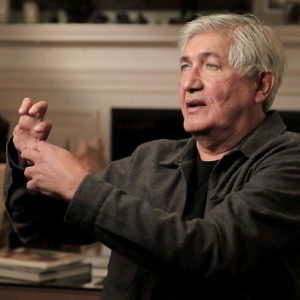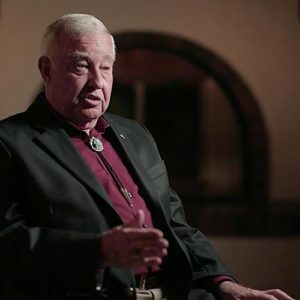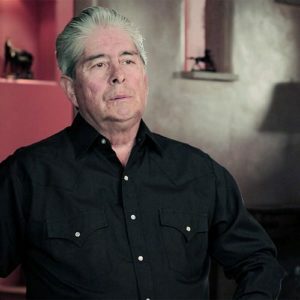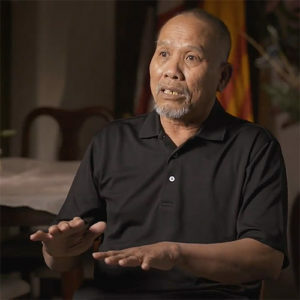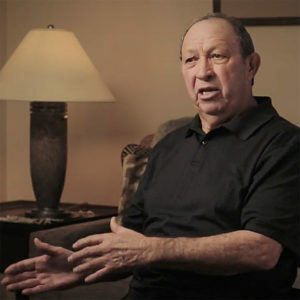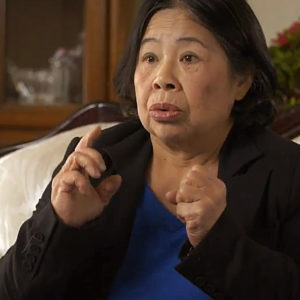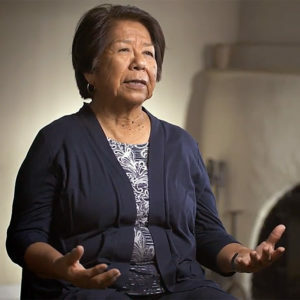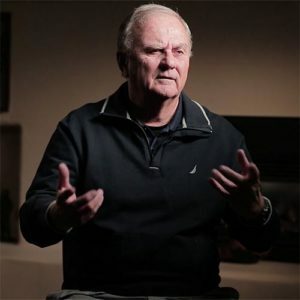New Mexico & the Vietnam War: Portrait of a Generation
DON LOFTIS
Don's Story
(Note: this is the full transcript of the Loftis interview, edited only for readability)
Well it was very, very strange, in 1968-67, when the draft calls were 80,000 a month, everybody was concerned. You go to check your grades at the professor’s door and if a failing mark you hear: “Oh no! I’m going to Vietnam now!"
So, there was a lot of contemplation to go down and try to sign up or wait and see what happens. I sort of waited and then was drafted. And then because I was a college graduate they allowed me to take a test and they said you can go to officer candidate school. So that’s how I got started.
It was sort of anti-climactic, because they give you a notice just to take a physical, then you take the physical, then you pass it, and then you start getting serious. You know that you are on the block. This was before the lottery.
A memorable moment was standing there in the line where you had to give your analysis test. The guy next to me I knew was a football player. You know a 6 foot five 280 pound physical monster. And, he flunked his physical, even though he was a star on the football team. And I passed mine with flying colors. He didn't have anything to worry about. I did.
"You know you are not in charge anymore. Uncle Sam now is in charge."
In terms of the draft. Well you know, what do you do? Your life is totally up to someone else. You know you are not in charge anymore. Uncle Sam now is in charge.
I didn’t come from a military family, but I wasn’t scared. There is a lot of time between when you enter the military and when you enter combat. But you know you might end up being a truck driver. Or a clerk, or someone that's not in harm’s way. No, I wasn’t afraid. Dear Don, Uncle Sam wants you. Lot of technical stuff in the draft notice about where to show up and how to dress etc. But the big news was you're drafted. It said report to the Houston in Processing Station and don’t bring any clothes, don’t bring your social security card. And, be prepared not to return home that night.
It was a charter flight to Vietnam, it left out of Oakland. And, I arrived New Year’s Day. When we landed the head stewardess said, “Well welcome to Saigon, happy friggin New Year”. And everybody sort of... well, there wasn’t a lot of cheering for New Years’. But when we arrived, you’re familiar with war stories from your training, you think you’re going to get a helmet on and crawl off the plane into a ditch and there will be combat everywhere.
Wrong.
But the funny thing is… some funky person set up a process where as you walked off the plane, the guys waiting to get on your plane to go home were right there, you walk side by side. Of course they jeered the hell out of you. You're getting nervous and they are going home. Kind of a cruel way to introduce someone to the war. You just try to ignore it. I mean there's nothing you can do.
And of course, you're astonished that everything looks kind of normal. It looks kind of like an airport.
You get there and you're put on a bus. The only thing that looks like there might be danger is the wire over the windows. But other than that you're in uniform, it's a nice day, and you're driving. You look out and you see people playing softball, volleyball, and a swimming pool.
And, hey this is okay, this is pretty nice. Go out to the nice barracks, you check in, go through some classes. The next day, you’re sent out to another headquarters. And, it was in an old French officers club. It was very nice. At night we played poker and had a good meal. And then went to a division compound-- very nice. And long story short by the time I got to the unit I was with, it was total culture shock.
I was a senior advisor to the Vietnamese infantry battalion. My roommate in all training and assignments at Fort Benning stayed there as we all got our orders after about 3 or 4 months. Joe and I had orders for the 101st airborne. Then an order comes down and says 500 lieutenants and captains are needed to go to language school and become advisors. They said 'well we checked your records'. And I think they just went down A through L and by the time they got to L they got to 500.
So I went to language school and my buddy, Joe Rufty went to the 101st Airborne. And I didn’t, the 26 weeks of language school delayed me getting there. Joe was killed the month I got there, January 21st on Hamburger Hill. He was a fine officer and was awarded the Silver Star. So, it's one of those coincidences, and I just happened to get lucky. I was just on the right end of the alphabet I guess.
I was not in command. I was a senior advisor to the Battalion commander, a battalion was about 600 men. And our mission was to destroy the enemy. Well my counterpart-the Battalion Commander, had been in that unit for 13 years fighting VC. You know 13 years. I had been there 13 days. I wasn’t going to give him a lot of advice. You know what advisors really ended up being, like they are today in Syria, Afghanistan, etc., are to provide combat support. Artillery, airstrikes, medevacs, logistics and conducting air assaults via helicopters. Because you speak English and they don't necessarily, you start to run those operations, but the battalion commander is still in charge.
We used to go to a Navy base headquarters (Ben Luc) and catch these LST's and go up the river. When we arrived at the correct spot everybody would dismount the boats. And start running. The Vietnamese probably weighed 105 pounds each versus the American at a 160, 180, 190 pounds. And they would tip, tip, tip, across the water. And we would slurp, slurp, crawl... could barely move. The mud would be up to your waist. With 40, 50, 60 pounds on your back, you just had to crawl until you could get up. And so you would spend weeks in an area between that river and the Cambodian border.
We were looking for caches, looking for enemy, looking for just anything you could find. Mainly you're looking at arms caches, because they would bring them down all these canals and dump them in the river. And then the VC could come and retrieve them and take them back to South Vietnam to use. We were trying to break that chain.
Well, the very first operation I went on we found five different huge caches, so that was significant. I didn't know how significant, but the CIA even flew out and looked and took some samples, so it was significant that the CIA would be interested. It was more than we could carry so we had to use helicopters to lift it all out. But yeah I think we were successful in that, but overall how do you know.
I kept getting shot at. Remember I was battalion senior advisor, so on an ambush for example, I would go with a squad of 9 or 10 men to see their state of training. Normally, you don't have any Americans with them and you're back behind them by maybe half a mile. But, the battle field has no front, so yeah there were sometimes you were directly shot at.
I know many times I was in my blissful ignorance, I would kind of raise my head, and my 13 year experienced counterpart would grab me and pull me down. Because he knew more than I did about where the bullets were flying. And, I’m thankful. One time I remember we were set up in a cemetery and there wasn’t a lot of cover in the tombstones, and boy it was like a western movie with the zings off the tombstones coming from all around you.
Something funny happened. There were four hooches out in front of that cemetery and we started receiving fire from them. And one of the things I used to do was call for some illumination flares so we could see what was going on while we were getting our mortars ready. One of the flares’ parachutes didn't deploy and so it went straight down and hit that hooch and started a massive fire. And the Vietnamese looked at me like I was some God. They didn't think I could do that, be that accurate. They were always asking me afterward, "Put a flair on that" I said “Come on guys, I’m not that good." So that was a good example of sheer luck.
Because of the negative public opinion over the ARVN combat readiness we started examining their training. The soldiers would come out of their training, go straight to a combat unit and the next day they are on operations. I convinced the battalion commander to go with me on a squad ambush just to see how good the soldiers were and what they were doing. We had a contact. The poor VC walked directly in front of us and the ARVN fired every last piece of ammo they had. Didn't hit a thing. So, we decided to get some marksmanship training. These guys couldn't hit a barn. We brought in a US marksmanship training cadre. I think the battalion commander was a little embarrassed about how bad they were at firing. And it helped a lot. Our kill ratio and body count went way up.
So, you know the one thing you get in any of these third world countries is corruption. Corruption dribbles down, and bubbles up. For example, if you didn't want your son to be a machine gunner then you paid a little bit of money. When he went to the unit the Sergeant Major would take that money and make sure he got into headquarters. And then poor ole Joe who didn't have a wealthy family carried that machine gun. So some of that stuff you tolerated because that was their life. That was the way it happened. But it did it did help the morale a lot.
You know you had so little time because our cycle would be 20-28 days on an operation. Then back in for three days’ rest, recuperation, clean up and then out again for 20 or so days. Basically I don't think I had a big impact. I don't think I gave a lot of great advice because my counterpart had been fighting VC for 13 years. In fact I asked him one day, "How did you become the battalion commander?" he said “Well it was 13 years ago when I joined this battalion. Now I'm the only one of the lieutenants still alive. So he rose to be the commander.
He spoke relatively good English. He was always studying - studying something. You never see him not working. I asked him 'What are you studying?" "Studying Chinese", he said, "I can speak French and learned English because you were coming. You're leaving now and the Chinese will come." Hell of a perspective he had. And it's true Chinese are there now there. Americans are not.
When I felt like I was doing some good was during the Cambodia Invasion. If you remember Nixon authorized American forces to go into Cambodia with the ARVN to attack the sanctuary that the North Vietnamese had built up via the Ho Chi Minh trail. Attacking right into the North Vietnamese forces you had to use modern tactics to take them out. I think I helped him a lot because a couple times, you could tell he wasn't quite sure what to do, and I was able to give him some advice. The best advice I gave him was how to give suppressive fire on the enemy while another unit moves. I think he learned that from me. I don't think he would ever admit it.
One time I said you need to call for armor. Don't be bashful, you must call your commander and get tanks and other assault vehicles. We were pinned down and couldn't move and were taking causalities. He finally called the armor and we flanked the NVA with tanks and armored personnel carriers while we suppressed the NVA with artillery and routed the enemy. That took three days, but it was a pretty good lesson learned.
You have probably heard this from other veterans that Vietnam was five minutes of sheer terror, followed by two or three weeks of boredom. Firefights are the way it is. You set up ambushes, you run into the VC, and then you go another week or so and nothing will happen. So what you're thinking of is: number 1, am I behind something that will protect me? And number: you're the advisor to the commander and his primary source of firepower. Number 3: let me start trying to get artillery, illumination for a gun ship, or whatever is needed. But let me start working those assets and immediately get on the radio to get his attention. And when he is ready to tell you where he wants it, you're ready and you're not waiting for 5 or 10 minutes. Funny but you're not scared, because you don't have time to be scared. You're doing what you must do. If you laid there and did nothing you would really get scared.
I found that when we operated in Vietnam, not in Cambodia, but in Vietnam, we would go find an area and sit there and saturate it. Like a wagon wheel we would have units stretched out in a circle. And we would set there in the middle and basically we were trying to starve them out. Eventually the VC have to come out of their hole to go get something to eat, or get ammo. And so in daytime we would sleep. And then we would stay up all night and move around. And sure enough we would catch somebody, capture him and kill him. Often they would have a shopping list. You know for a bottle of nuoc mam, three ducks and four chickens. That worked very well. But, the U.S. forces thought we should be moving all the time. So one American officer (company commander) complained. He came to coordinate a combined operation, and we were asleep. "Just like the Vietnamese, all sleeping and laying around", and I said "Number one, we do this 28 days in a row, and we go out every night and we stay out all night and we rest in the day time." I said "These guys have been doing this for 13, 14, 15 years and they are not in a big rush. They know this isn't going to be over in a year like we think. So respect them, this is their country, this is their war, and this is the way they are fighting it. They are not sitting back in some base camp, they are out here in the field fighting every day. And there are not any rewards, they are not going on R & R, they don't have a PX to go to, they don't have those fancy Bob Hope shows to go watch. This is their life and it's not a very good life, but that's what they have been signed up to do. So I think we should look at it from their perspective." Yeah they were pretty good soldiers. We fought toe-to-toe with a North Vietnamese regiment in Cambodia. And, we won. I've even got their battle flag we captured which was given to me by the South Vietnamese. So yeah, I think they were okay.
As units were being moved around for the upcoming Cambodian Invasion we were moved from the Delta to an area near the Michelin rubber plantation. There was a little French fort where we were to replace another unit. But they didn't get the word that we were coming to replace them. So we stopped because one of the worst things you can do is have two different units intermingled in the same place. Because they get into fights, they steal from one another, etc. So they said, "Alright, we didn't know you were coming so just go down here to this corner of the rubber plantation in this little village and spend the night and tomorrow we will work out you moving in." So we went down there, totally unannounced. So some of the things that you hear about the Vietnamese units, there are two different ones. There is kind of a militia (RF/PF), then the tactical divisional units. I was in a tactical regimental unit. The ones that stayed around the villages were the militia. So what we found was happening in this particular area, the militia would let the VC know where the ambushes were, and so the VC could go and come, and nobody was getting shot, it was a nice arrangement. So suddenly here were 500 Vietnamese troops parked right in the middle of this village. I will never forget: we were standing in this guy’s front yard and suddenly the shooting started and I looked over at the front door where this guy lived and he comes out with an AK-47 and just starts spraying everybody. We shot him of course, but here we are in absolute chaos in this village. I don’t know half of them were VC I guess, because they all had AK-47's and they are all shooting at us.
And so we maneuvered some soldiers, and the VC started moving out to a creek bed. The VC had mortars with them, soon began mortaring us. So here we are, in an area we didn't know anything about, we were receiving fire from all around. My Vietnamese counterpart asked if I could call for gunships because he knew we were too close for artillery. So I called in the gun ships. You light a strobe light and it blinks so the pilots know that you're not the one to shoot at. I said just start pouring it on that stream bed.
As the gunships were pouring rockets in the stream bed, one of the staff officers (US Advisor) in the French Fort called me up, "What are you doing? You're wasting these gunships". I said, "We are killing VC leave us alone." And you know one of the rules is never overturn somebody's decision when they are on the ground and you are in a building looking at a map. So I just ignored him and told him to leave us alone. The next morning we did our sweep of that stream bed and found 13 dead enemy from those gun ship attacks.
This officer from the night before said, "Well you really caused a ruckus last night." (He didn't know yet what the body count was). "Yeah, yeah, we did real well." I told him. I think he was upset that we had done so well I guess. That was just an example of one fight that was very strange, but that ended up very well. We had no casualties.
Well now-a-days you look at all these night vision goggles that just clip on people's helmets. The thing we had for night vision, if you had any, was called a Starlight Scope. It weighted about 15lbs and gave you maybe a 100 meters visibility at best. Real grainy, real hard to look at. So basically you didn’t use it, because you could barely see out of it.
A lesson learned from that little battle was: You know what your job is and you do your job. You do your best to move to a position where you are not as vulnerable as you could be. I remember this guy had a huge stack of tin, I guess to build a new house or something. We got in and around that tin to protect us. Because that would really make a noise when the rounds were hitting it. But the biggest thing at night in that instance, we got in there after dark, is to not have our people shooting each other. That was probably the biggest fear. We didn't have anything rehearsed, planned, or plotted. We were just there, and the commander did a great job of telling his soldiers not to fire unless you were fired upon and only then. Otherwise if you would have just let everybody lose we would have had self-inflicted casualties. But it kept them under control and that worked out pretty good.
Well I was afraid I was going hit friendlies with the gunships. I wasn't familiar with the location at all. I looked at the map and determined there was a stream-bed. I hadn't even seen it in the daylight. So I just assumed there was a stream bed there, because it was on the map. My biggest fear was there was another piece of the village over there, and I was going to hit it. Now the pilots, they have night vision, they can see better than you can. They would have probably cautioned me if they happened upon a village or something. But my biggest fear was hitting friendlies or civilians.
You turn that strobe light on and it would start drawing fire. I had learned by then that when you turn on the strobe light on, you toss it out away from you. And sure enough they were shooting at that strobe light. But if you just held it you would have been a goner. Again, yeah you’re scared to death from fear of initially getting shot but you immediately get out of that and go into what's your mission, what are you trying to do? Get the gun ships. Get the artillery. Get illumination going. You generally do not have your artillery and illumination going at the same time you have helicopters, because you could accidentally shoot your own helicopter out of the air.
Well as an advisor for the battalion commander, I carried an M16. But if I was shooting my M16 I wasn't doing my job. So I wasn't physically John Wayneing it at all. My weapon was my hand set and my radio. Because that's where I got all the firepower. That was my job. I didn't worry about firing at night. Generally if you shoot at night, you tend to shoot too high. You train soldiers to shoot lower. But other than that if they are using tracers you can use that as a pin point.
After we moved into the new area at the rubber plantation, near the French fort, we replaced another battalion. We were waiting on orders, this is the build-up for Cambodia. There were a lot of unknowns because of trying to keep that operation secret so we weren't moving out as much. I was sitting outside the compound by the little guard shack talking to the guard. This Vietnamese man came running up asking, "Can you get a medevac? Can you get a medevac? We have a child that has been injured!" so I called medevac and it got there and the child was not there yet. And, they are a little peeved at me. Because here I call a medevac a precious commodity and nobody had showed up. So they were about ready to leave when this screaming came from this man on a moped and I couldn't see anything but him because he was coming toward me. He was screaming in a little bit of English, "help me help me help me!" So he pulls up there and I look on his back and his daughter is hanging onto him. She had hit a booby trap that was a white phosphorus grenade and that phosphorus will burn right through you. So I ran over to pick her up and get her off the bike, hollering at the medivac to get started and this corpsman came over with the stretcher. So as we lifted her to put her on the stretcher, all the skin came off of her arm, and it was in my hands. All I could see was the bone. Of course she was in shock her eyes were this big. She wasn't screaming or crying because she was in shock. So then the corpsman helped me lift her into the helicopter and as we did the skin on her back came off in our hands. The corpsman dropped down and started puking. I started trying to get her comfortable and then we got her into the helicopter and let her father go with her. Never heard if she lived or died, but you know my point was you forget about the civilian casualties in war time. And, they are gruesome. Usually much more so than soldiers because they're generally not treated. They're generally not expected and they don't have the protective equipment. And so here is a perfect example of young girl didn't do anything to anybody but she probably died or if not she's suffered the rest of her life with massive scars. That was certainly very memorable. Something you never forget-- never goes away. I wrote a poem about this…
The biggest thing a Vietnam vet ran into was culture shock. And probably as an advisor even more. As I mentioned earlier, the airmen were out there playing volleyball, swimming in swimming pools, and then the next stop is a French officers club. The next stop is the division headquarters, yeah it was still pretty nice. Next stop was a brigade headquarters and it was all right. It wasn't luxurious, but is ok. So the next stop they fly you out in a helicopter. You drop down in a little tiny helipad because the rest of it is covered in water from the Delta and the tide was in. They come help you with your duffel bag and then go over to this compound and they throw your stuff underneath this little thatch roof. And you look around it and it is absolutely the most desolate, screwed up looking place you've ever seen. The first thing I saw was a ditch they ran inside the compound. It is about a foot deep, 8 inches wide and the water in it was black. So what is this? Well anything you don't want goes in there and I said 'man, even bodily fluid?" “Well we try not to do that.” So later that night they showed me where the bathroom was and it was a little piece of wood across the water. You had two 2x4’s to stood on and do your thing.
In the Cambodian Invasion we lost this one battle, there was an intersection of rice paddies and there was a spider hole everywhere at every intersection - a guy with thatched hat on his head. You couldn't see it because it looks just like the rice. The NVA let us get in the middle of all these rice paddy intersections and then raised up and started firing. We didn't know where it was coming from. Left rear… right rear… left front… direct front… It was everywhere. So we lost about 45 men within seconds -- killed just like that. The rest of us were just lying flat. So that went on for three or four, five hours trying to figure out what was happening. What could we do? Shooting, we tried to get control, then we called in gunships and the second gunship was shot down. Next was a Vietnamese aircraft a Sky-Raider and it was shot down. And then I called in a F100 and it was shot down. And so you know you start thinking "I think these guys are pretty significant. They know what they are doing.” And then later we finally brought in F4's and they silenced the anti-aircraft guns that were doing the damage. But watching those 40 people die just like that in seconds was... it was unbelievable.
Then, in the second or third night after the battle we started to see these lights move. And they were moving between our right company and our headquarters, and then our left company. They were moving right between us on a bamboo trail. We got word they were North Vietnamese. And this lasted for like an hour. There were that many NVA soldiers. As the US was attacking Cambodia with the South Vietnamese, the NVA were getting completely split up. So they would find some soldiers they would just join, they didn't know what unit they were. They were asking our soldiers” What unit are you from?” That whole thing took about five or 6 hours of almost constant contact with North Vietnamese to get our soldiers away from the NVA.
One of the things that struck me the most when I came back, a friend and l, were talking about what we learned in Vietnam. This was in 1971. My point was if we had left the ARVN with the ability to fight with artillery and airstrikes and all the other combat support things, plus the logistics, they could have won that war-- the South Vietnamese. They had the talent and the capability, but when we decided to move out because of an election and because of the public pressure, we doomed them. They were not going make it. I made that estimate in 1971. I knew they were weren't going to be successful. And sure enough they weren't. They had the ability they just didn't have the resources to do it. And they certainly had the heart. Those soldiers worked as hard as anybody.
Being an advisor--you're at the mercy of the logistics of the South Vietnamese and one of the things that we never had was fresh water. We always had to drink from the stream. And we always put our tablets in, but the tablets were only an organic purification—not chemical. The area we were in had been completed defoliated. It was the area west of Saigon, called the Plain of Reeds and there was not a tree left standing. It had all been defoliated and we were constantly drinking that water. One of the issues was the lack of fresh water and that had been defoliated multiple times. I was diagnosed 20 years after the Vietnam War with prostate cancer and there's no doubt in my mind that Agent Orange was the cause. The photo of the bomb craters was taken in the area where we operated. That shows over time there'd been a lot of activity. You can see generations of bomb craters in that area.
Before the war had gotten heated, probably in the in the early 60's, that area had several villages several bamboo thickets, lots of trees. And then there was not a tree standing, there was not a village standing, the only thing there were these reed's that were 10 to 12 feet tall. Somehow they were unaffected by Agent Orange. Everything else would either been destroyed by bombs, or by Agent Orange. The bomb craters were a place to get water and take a bath they look so pristine and clean. But none of us realized there's chemicals in the water. There was no warning and no idea that Agent Orange was in the water. In fact one of the strange things was that there were not any birds. Not a bird. Ever. Because they are dead from Agent Orange or scared from the noise from the combat.
Another thing, the Vietnamese didn't have malaria. They had built up immunity because they had lived there all their life. But Americans didn't and you had to take your pills. We ran out of pills in Cambodia. So I contracted malaria. You have to live with that your whole life. It doesn't leave your body.
Wrapping up… America is a great nation. Let's think about our veterans and think about what they've contributed and not just the ones in Vietnam but the ones that are currently coming back from Afghanistan. Let’s embrace them. Let's give them all the help we can. Let's understand that they've been through things that the rest of the rest of the country will never understand. You won't understand them sometimes. We must have institutions that can help those people that need help. We need to help those folks because they helped us by doing what the nation is asked them to do. Let's try a little harder. Try a harder to listen and understand when they're asking for help and let's give it to them.
My service in the Vietnam War was inspiring and gave me a sense of what the ground soldier could contribute to a combat situation. As a 1st Lt, I was given the responsibility to support a major combat battalion in every way, artillery, airstrikes, gunships, medevacs and air assault operations. I could do this during a major campaign (Invasion of Cambodia 1971) in the Vietnam War. My contribution to the Army of the Republic of Vietnam inspired me to remain in the military for an entire career. The ability to accomplish hard things in tough situations gave me a foundation to succeed at every level in the Army during my career.
Through The Lens
Photos of and by Don Loftis
Most of these photographs were taken with a Kodak camera given to Don as a gift from his grandmother. The camera stopped working when monsoon season began.
"What War Is"
Listen to the old men talk at the bar
About their time in Nam
"Oh it was bad..oh I can't believe I am
Still alive"
I don't remember me or them but I remember the people.
Like
The day she came
By a call for a medevac so I left the shack
Popped smoke and wondered where the heck she was
Called in the bird and ran out to say she was near
Then I heard the moped screaming at me
-We're here, we're here... she
Is here-
PapaSan drove the bike
And she held on to his back.
Tears streamed down his face… rage… fear
"Oh my god help her… help her"
I ran to her and saw her face… frozen in shock
Drooling fluids from her soul… too hurt
To cry... too much horror for one so young
Yet alive, aware and scared that those there to aid
Were the same who delivered her pain.
"It's OK, it's OK… I am here to help"
As I reached for her tiny arm to help her from the bike,
I then saw the skin come off in my hands... charred to her skinny bones
She looked at me and cried, her eyes as large as her mouth that could not scream.
I grabbed her waist and felt the same melted mess and fell to my knees to not drop her.
The young medic came running with a bag to put her in
He puked and cried as we collected her
Then she and PapaSan got on the bird.
As it flew away I sat down, looked at my hands and cried
She wasn't a hero… she got no medal but her country took her life.
More Veteran Profiles Below | Back to New Mexico & Vietnam War Page

